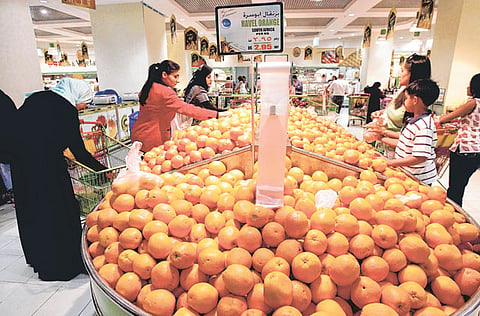Don’t pay heed to whispers about food shortages
UAE and Gulf states have invested heavily to guarantee security and supply for months

Solid data and facts related to food security in the UAE and other GCC countries offer reassurances of sufficient stock to meet its peoples’ needs. Undoubtedly, such data help maintain stability in the trade in food items and well away from panic and intimidation, especially by those outside of the market who exploit social media platforms in a vulgar and unprofessional manner.
Avoiding such distractions, the most important point here is to focus on the fact that the data for the UAE that does not differ from those in the other GCC countries, which enjoy relatively high levels of food security. In the UAE, there are multiple farms producing white and red meat, dairy products, grain milling silos and other agricultural produce that meet a sizeable share of local needs.
For instance, flour mills, especially the big ones in Abu Dhabi, have a daily production of 850 tonnes of flour and are subsidised by the state. These mills produce animal fodder for dairy and meat farms, while storage of wheat in the country equates to supplies for nine months to meet full domestic demand. Rice and sugar supplies are available for six months, and all essential items, whose demands can be easily met.
Poultry production amounts to 110,000 birds per day, which meets most local needs, in addition to 400 million eggs per year, and 25 per cent of the country’s need for red meat, produced by breeding 1.5 million livestock. Meanwhile, dairy production is half a million litres a day, in addition to 150,000 litres of juices.
No need to go into frenzied buying
Due to these documented data, taken from their main sources, it is possible to conclude with confidence that the food situation in the country is extremely reassuring.
This is supported by some objective and solid facts that can be briefly concluded in several important matters. First, the movement of food imports continues and will not stop for a simple reason that there is no justification for halting it in light of health measures and precautions that are in place.
At the same time, the UN Food and Agriculture Organisation (FAO) last weekend reported a sharp decline in global food prices, driven by a drop in demand due to the effects of the coronavirus pandemic and low oil prices.
A third factor is that domestic food demand is expected to decrease by 15 to 20 per cent due to the absence of foreign tourists as a result of restrictions placed to contain the pandemic. The UAE received almost 30 million tourists last year.
Bearing in mind the suspension of air, sea and land passenger traffic and the remarkable decline in the activities of hotels and restaurants, there will more than sufficient food supply for this year.
Make it a Gulf-wide priority
During a recent summit, the Gulf’s ministers of trade discussed a proposal to establish a GCC food security network — much like the one for the power grid — with the aim of achieving food security in the region and ensuring sufficient supplies.
The GCC’s collective security will contribute to supporting supplies, particularly since some countries like the UAE has invested heavily in essential agricultural production. Saudi Arabia and Oman enjoy a diverse climate, which gives them flexibility in food production.
Bahrain and Kuwait have huge silos for wheat production, and poultry farms that were established nearly 50 years, in addition to their expansion in high-priority agriculture.
No doubt a Gulf-wide integration would contribute to ensuring sufficient food supply and strengthening collective food security. All these facts show that food security in the GCC countries enjoy government-mandated guarantees and are ready for any emergency situations.
This clearly means there is no need to panic or give in to exaggerations. Listen only to the official authorities, who have the right data and know the reality of the situation. This state of reassurance requires everyone to stay at home so that this pandemic ends quickly.
Dr Mohammad Al Asoomi is a specialist on energy and Gulf economic affairs.



